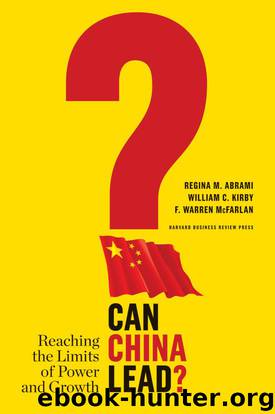Can China Lead?: Reaching the Limits of Power and Growth by Abrami Regina M. & Kirby William C. & McFarlan F. Warren

Author:Abrami, Regina M. & Kirby, William C. & McFarlan, F. Warren [Abrami, Regina M.]
Language: eng
Format: epub
ISBN: 9781422144152
Publisher: Harvard Business Review Press
Published: 2014-01-28T00:00:00+00:00
Infrastructure
The rapid development of hard infrastructure and much slower development of soft infrastructure vis-à-vis the West creates both commercial opportunities and risks. We can see this in the examples of Sealed Air, Yili, and LongTop.
Sealed Air. By contributing to the development of soft infrastructure such as national standards, an organization can be seen as a good citizen of China. Sealed Air, the American packaging company, has built a successful operation of five hundred people in China on this basis.15 Packaging in the meat products area offers the opportunity to significantly improve both the safety and the yield of meat products for the Chinese consumer. Its business is based on the assumption that urban supermarkets, not open markets, are the future, and that meat and other perishables have to be packaged for that purpose. It assumes, too, that instead of every fifth truck from Nanjing to Shanghai carrying live pigs (as was still the case in 2008), a modern refrigerated trucking industry will eventually be able to get Sealed Air’s well-sealed packages to the supermarkets in good condition. Critical to the company’s success has been its tireless work over a long period of time on various government standard-setting bodies to help China evolve and implement standards to catch up with global best practices in food quality and hygiene. In this context, Sealed Air is a desirable company to both the provincial and the national government because it is using its technology and skills to help an important industry in China to raise its standards to world level. By being in the center of this standard-setting process, Sealed Air is seen as improving the health and safety of the Chinese population and thus is welcome to grow and to make profits.
Yili. The absence of standards can have devastating consequences. Consider the case of Yili, a publicly traded state-owned dairy company located in Inner Mongolia.16 Over the past fifteen years, the dairy industry’s growth has been led by Yili, which had convinced tens of millions of lactose-intolerant Chinese, who historically have not liked milk, that only milk will help their children grow.
Yili invested in extensive research and development (with a staff of five hundred in R&D) and worked with medical experts to create additives to make milk more digestible to the Chinese. Its marketing platform took advantage of Chinese consumers’ association of milk with Inner Mongolia’s green grassland.
Yili also confronted the fact that milk had been considered a luxury product consumed only by the wealthy and the foreign. It wanted to make it a middle-class drink. But keeping milk fresh and affordable was a major challenge. The cold-chain process that kept pasteurized milk fresh for seven to ten days was costly in terms of both production and logistics, thus keeping prices high. To make milk available to a geographically wide range of consumers, Yili rapidly acquired smaller rivals, expanding its network. It also adopted the ultra-high-temperature (UHT) process, widely used in Europe, to dramatically extend the shelf life of its milk.
But Yili’s success also rested on changes in the countryside, especially in the nature of dairy farming in China.
Download
This site does not store any files on its server. We only index and link to content provided by other sites. Please contact the content providers to delete copyright contents if any and email us, we'll remove relevant links or contents immediately.
Rich Dad Poor Dad by Robert T. Kiyosaki(6613)
Bad Blood by John Carreyrou(6611)
Principles: Life and Work by Ray Dalio(6422)
Playing to Win_ How Strategy Really Works by A.G. Lafley & Roger L. Martin(6252)
Management Strategies for the Cloud Revolution: How Cloud Computing Is Transforming Business and Why You Can't Afford to Be Left Behind by Charles Babcock(4569)
The Confidence Code by Katty Kay(4251)
Thinking in Bets by Annie Duke(4218)
American Kingpin by Nick Bilton(3876)
Delivering Happiness by Tony Hsieh(3418)
Project Animal Farm: An Accidental Journey into the Secret World of Farming and the Truth About Our Food by Sonia Faruqi(3216)
The Power of Habit by Charles Duhigg(3130)
The Tyranny of Metrics by Jerry Z. Muller(3067)
The Marketing Plan Handbook: Develop Big-Picture Marketing Plans for Pennies on the Dollar by Robert W. Bly(3057)
Brotopia by Emily Chang(3050)
Mastering Bitcoin: Programming the Open Blockchain by Andreas M. Antonopoulos(3036)
I Live in the Future & Here's How It Works by Nick Bilton(2994)
The Content Trap by Bharat Anand(2917)
Building a StoryBrand by Donald Miller(2896)
Applied Empathy by Michael Ventura(2893)
